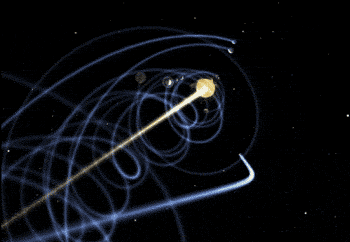Left versus right is a game of oscillation. The oscillation between the two poles creates heat. The heat creates movement.
The generation of heat, on a societal scale, is difficult and not meant to be easy. It also needs to be a complete game. Each side wants to win, and each side must feel everything is at stake.
Consider were it not this way: maybe you could get lazy, notice you are playing the game, and get away with attempting to generate the minimum heat possible. So when the heatball is in your court, you hang on to it languidly for a bit before tiring or boring and throwing it across. It would seem in this case the heat generated is not capable of much movement. Maybe an inch.
Or consider the counter-scenario in which when your side has the ball, you would literally rather die than see it in the hands of your opponents.
If you want to observe what each side really wanting the ball does for outcomes, then this is a really good game. And: Everyone involved—the simulation-runners and thus the participants—want a really good game, whether implicitly or explicitly.
In less codified words, that you feel the world is worsening or ending because one side is having its way with the ball is the way you’re supposed to feel—the way this game is supposed to make you feel. Because if it didn’t, there would be no game. No game means no heat. And no heat means no movement.
Imagine a solar system spiraling through space. You have the individual planets orbiting some axis in what appears to be fixed motion. But then you have the entire system itself pushing through forward space. In our example, it is the oscillation of these planets that give the system as a whole the momentum to move through space.

I suppose we might ask, where do our own political and social oscillations take us? Is it a progressive forward motion? Is it random zig-zags through unexplored space? Is it backwards motion?
The answer is yes.
In (my) simulation theory, the goal of the simulation is to create amusing results that could not be anticipated or pre-calculated by the simulator. This would create the most compelling simulation for both the runner and the players. Running a simulation which you otherwise know the result and outcome for is like playing the same video game over and over. One would go mad.
To create a great simulation which does not die of its own predictability, the runners have to be perpetually amused by surprising outcomes, and the players then must fundamentally have no idea where the fuck they are or where they’re going.
Is this a nihilistic perspective, or an opportunistic one? Can one believe this is just a game and oscillations in belief are just a means of generating heat, yet still believe that we are progressing towards the total annihilation of human suffering, or is human suffering itself just a function of these oscillations—oil for the machine? Are our own emotions tied to the phased oscillations of the team we play for, or are our emotions heat generation for our own body? Is the motion of human-time forward or random?
Yes.